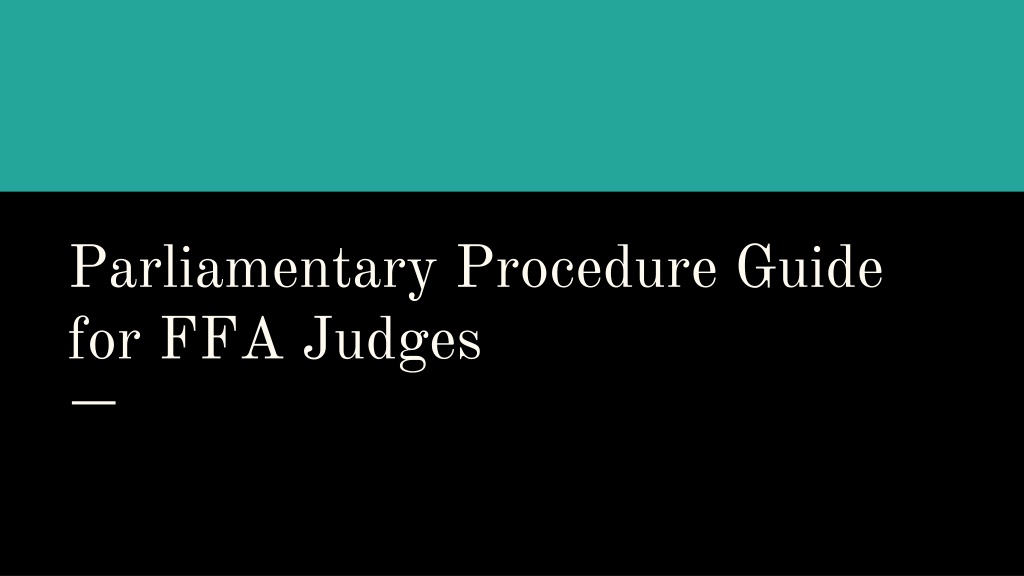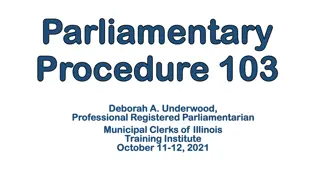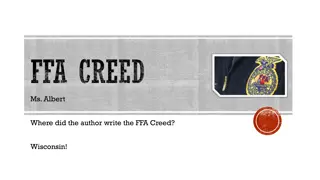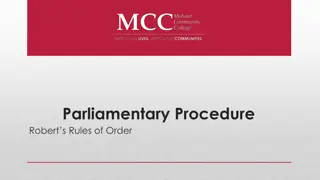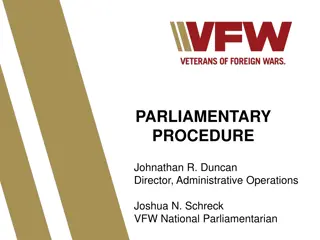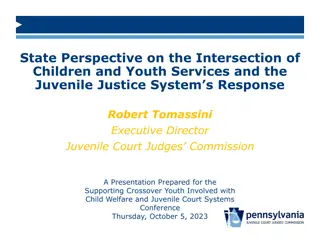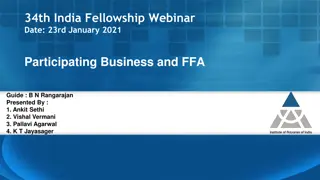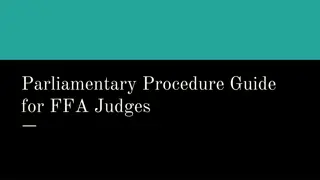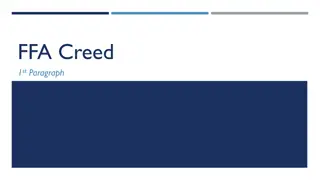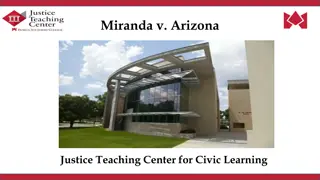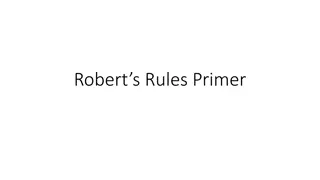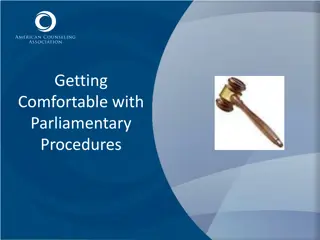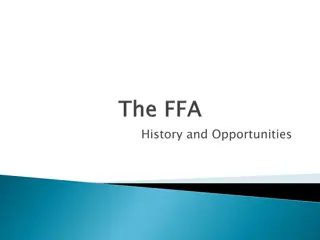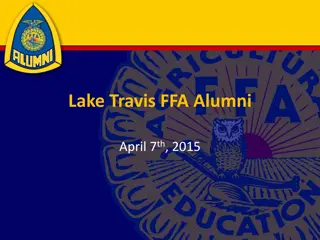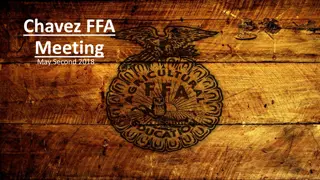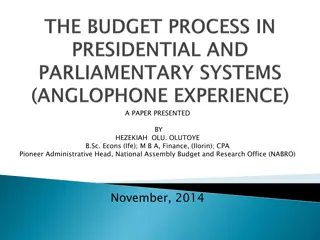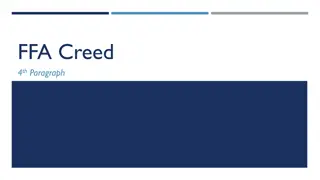FFA Parliamentary Procedure Guide for Judges
This guide provides essential information for judges participating in the FFA Parliamentary Procedure Career Development Event. It covers event rules, room set-up instructions, changes in opening ceremonies, and the selection process of subjects and abilities to be demonstrated by teams. Judges are encouraged to review the guide thoroughly to ensure fair evaluation of each team's performance.
Download Presentation

Please find below an Image/Link to download the presentation.
The content on the website is provided AS IS for your information and personal use only. It may not be sold, licensed, or shared on other websites without obtaining consent from the author.If you encounter any issues during the download, it is possible that the publisher has removed the file from their server.
You are allowed to download the files provided on this website for personal or commercial use, subject to the condition that they are used lawfully. All files are the property of their respective owners.
The content on the website is provided AS IS for your information and personal use only. It may not be sold, licensed, or shared on other websites without obtaining consent from the author.
E N D
Presentation Transcript
Parliamentary Procedure Guide for FFA Judges
Note to Judges This presentation s purpose is to prepare judges for NC FFA Association Parliamentary Procedure Career Development Event. The changes and rules for this event will be explained in this presentation The Parliamentary Procedure CDE guide is broken down into parts I-V. Review of these sections prior to the start of the event is necessary to fairly evaluate each team. The guidelines for the federation and regional events is different from the state event. Different scorecards are to used to evaluate the federation and regional events and the preliminary round and final round at the state event.
Room Set-up Please set up the room according to the diagram in the FFA Official Manual. One will be provided for you at the contest. Each officer station, including the advisor, should have an officer plaque and the sheet showing the subject and abilities. Whenever possible, officers should not share the same table with another officer. The President should have a gavel at their station and the Secretary should also have multiple pieces of blank paper and pencils. The sheet indicating the five abilities to be demonstrated will be placed, face down, at each of the seven stations prior to the event by the judges. (Judges will need to turn sheets face down between demonstrations.) The advisor s part in the opening ceremony may be performed by a student or the FFA advisor. They DO NOT participate in the business portion of the meeting. If a student performs the advisor s part of the ceremony an advisor may also observe the presentation.
Change to Opening Ceremonies A change to the Reporter s part in Opening Ceremonies was approved in January 2017 to now read As the flag covers the United States of America, so I strive to inform the people in order that every man, woman and child may know that the FFA is a national organization that reaches from the state of Alaska to the Virgin Islands and from the state of Maine to Hawaii. North Carolina FFA members will be allowed to use the version as printed in the FFA Manual or the version above for the 2017 competition season WITHOUT penalty.
Subject/Ability Sheet Judges will select one subject and five abilities from the Subject/Abilities Sheet to be demonstrated prior to the event. The subject and all five abilities selected will be indicated with a circle on the Subject and Abilities Sheet. ALL TEAMS WILL USE IDENTICAL SUBJECT AND ABILITIES SHEETS WITHIN THE SAME CONTEST. At State Convention, the Subject/Ability sheets should be the same for all teams within each flight. The Subject/Ability sheet will then change when moving to the second round at the state level.
Highlighting Assigned Abilities Change for 2016-17 Each of the five abilities circled will be assigned to one of the team members on the floor leaving the President without an assigned ability. The assigned abilities will be indicated by a neon highlighter marking the entire text for the particular ability on the Subject and Ability Sheet at that station. The president/chair's Subject and Ability Sheet will have all 5 assigned abilities circled and none of the abilities will be highlighted. The advisor should also have a Subject/Ability Sheet with all 5 assigned abilities circled, but nothing highlighted.
Ability #2 - Motion with an Amendment If this ability is required, it would only be highlighted on 1 floor member s Subject and Ability sheet. The member assigned this ability should not make an amendment to his/her own main motion. The amendment made by this member should be applied to a motion made by another member.
Ability #9 - Motion to Reconsider The motion to reconsider should be applied to a motion adopted earlier in the current meeting. Teams should not demonstrate this by applying reconsider to a motion in a previous meeting.
Order of Events Team members will enter the demonstration room and take their respective stations. Once seated, team members have time to look at the Subject and Abilities Sheet placed at their station. Judges may offer introductory comments during this time. The demonstration and the keeping of time by the timekeeper will commence when the president raps the gavel twice and the team should begin the demonstration with the official FFA opening ceremony. The official FFA opening and closing ceremony will not be performed in the final round of the state competition. After the FFA opening ceremony is complete, the business session may be preceded by a brief explanation of the subject (topic) by the president. The floor is then opened for discussion.
Closing Ceremony The meeting should end with the closing FFA ceremony with the exception of the final round at the state level event. If a motion to adjourn the meeting is performed then the closing ceremony should begin with We are about to adjourn this meeting of the _____ chapter. If there is not a motion to adjourn the meeting should end with the full closing ceremony.
Judges Comment Card Each judge is asked to provide comments on each demonstration using the comment cards provided in the guide. These comments are helpful to members to improve. Judges are asked to provide comments based on correct parliamentary law and not on personal preferences and styles. Comment cards should be collected by the event coordinator and given to the advisor for each team at a later time.
Spectators Spectators are permitted at Federation/Regional evnets as space allows. Judges should use their discretion based on the size of the room and the space for spectators. Spectators should not be in the direct line of sight of the participants as they may distract. Spectators may only enter prior to the first team in competition and must stay for all presentations. Spectators should be asked by a judge to power down all cell phone during the demonstrations and should be reminded to minimize distractions between each team. Spectators are not allowed to use their phones or communication devices while in the competition room. Should a distraction occur during the team performance that disrupts the demonstration, teams should be allowed to restart the entire meeting with all new scoring. Spectators will NOT be allowed for the State Event.
Assigning Points for Abilities Points will be allowed only the first time for a given ability regardless of the number of times the ability is performed by a team. Designated required abilities will be awarded points only if they are demonstrated by the assigned team member. Teams may perform additional abilities (beyond the five on which scoring is based) but risk loss of effectiveness of discussion and time penalty if they do so. Points for designated abilities will be based on quality of performance. Omission of the assigned motion/ability by the assigned member on the Subject and Abilities Sheet will result in a 50 point deduction from overall team presentation score.
Assigning Points Points awarded can be zero to the maximum allowed per ability. Full points should be given if an ability is performed according to Robert s Rules of Order. Teams should not be penalized for abilities based on style or tradition. A member may speak in debate on the main motion and conclude by offering a secondary motion. Judges will award points accordingly for both the debate and the secondary motion.
Time The timekeeper will be stationed in the middle of the group of officer stations and will stand for 15 seconds at the end of twelve (12) minutes. This will leave three (3) minutes to complete the business and close the meeting. If the performance lasts as long as fifteen (15) minutes, the timekeeper will stand at 15 minutes and remain standing until the performance is completed. The timekeeper will use a stopwatch to keep the time of the performance. Twenty (20) points are to be deducted by each judge from the team score for each minute or major fraction thereof that the team runs over fifteen (15) minutes or under twelve (12) minutes. (For example a team that went 15:29 would not lose points but a team that went 15:30 would be penalized 20 points.)
Minutes of the Meeting The secretary will be required to keep accurate minutes to include a record of each motion made. The secretary will have a maximum of five minutes after the conclusion of the closing ceremony to complete the minutes of the meeting and then submit them to the appropriate judge. Time keepers should restart their stopwatch at the conclusion of the meeting after writing down the meeting time and stop the secretary should they take the entire 5 minutes. It is suggested that The How in Parliamentary Procedure be consulted for recommendations on the keeping of notes by the secretary and the preparation of minutes of the meeting. Guidelines for scoring the Secretary s minutes are provided in the Helpful Guidelines section of the Parliamentary Procedure Guide.
Change to FFA Official Dress ALL students participating in Parliamentary Procedure are required to wear the FFA Official Dress. For each member not wearing complete official dress, 10 points should be deducted from final score as indicated on the score sheet. OFFICIAL FFA DRESS HAS BEEN CHANGED to include the following for both male and female members: An official FFA jacket zipped to the top. Black slacks and black socks/nylons or black skirt and black nylons. White collared blouse or white collared shirt. Official FFA tie or official FFA scarf. Black dress shoes with closed heel and toe. Note: Official garb of recognized religions may be worn with Official Dress.
State Level - Flights Teams will be randomly placed into flights by the event coordinator and will be announced at the start of the event. Teams MAY NOT change flights. Order of presentation within flights will be predetermined by the event coordinator by use of a computer generated draw or from drawing from a hat. Teams MAY NOT alter the order. In addition to participation in Parliamentary Procedure a participant may participant in the Prepared Public Speaking or Creed career development event. These events will be held during the same period of time. The Parliamentary Procedure CDE takes precedence over either Prepared Public Speaking and/or Creed. Dual participants should work with the other CDE superintendents for speaking order.
State Level Event - Preliminary Round Judges will be provided the multiple choice knowledge test score for each team. In the preliminary round the multiple choice knowledge test score will be used along with the team demonstration score to determine the overall team score.
State Level - Final Round The top two teams from each flight advances to the finals round. The team s score for the final round will include: Team Demonstration Score, Oral Questions and Multiple Choice Test. (The finals scorecard provide for all three components). In the Final round the opening and closing ceremony will not be performed. The meeting will begin with the president stating, Is there any new business? or What is the first item of business? The timekeeper should be trained and prepared to start the time when the President makes one of these statements. Time ends with I now declare this meeting adjourned and the tap of the gavel.
State Level - Finals Round Teams should complete their demonstration between 9 minutes and 12 minutes. Twenty points will be deducted by each judge for each minute or major fraction over 12 minutes or under 9 minutes. The timekeeper should stand for 15 seconds at 9 minutes and then sit. At 12 minutes the timekeeper will stand and remain standing until the meeting is adjourned.
State Level - Finals Round - Oral Questions Individual Questions Judges should create and assign questions prior to the start of the event for both the Individual and General portions of Oral Questions. This portion of Individual Questioning is untimed. After the secretary submits the minutes the team should rise and form a side by side line (shoulder to shoulder) in front of the judges.
State Level - Finals Round - Oral Questions Each member assigned an ability, excluding the president, will be asked a planned question which may include one to three parts related to their assigned motion/ability. The chairperson will be asked a question relating to presiding, debate, assigning the floor or other general parliamentary procedures. Floor members will be scored a maximum of 12 points for responses and the Chairman/President will be scored a maximum of 20 points.
State Level - Finals Round - Oral Questions General Questions This portion of the Oral Questions is timed. The timekeeper should start the time at the start of the first question and called out loudly at the end of 3 minutes STOP. The judges will have 3 minutes to ask clarifying questions related to the team s demonstration. Questions may be directed to the team or individuals. Team members may volunteer to answer the question for the team or an individual member. At the end of the three minutes teams will be stopped and no further questions will be asked. If the Vice President presides during the demonstration they may be asked similar questions as the president.
Scoring The proper scorecard based on the level of competition should be used for scoring. Each judge should compute a total score for each team. Each judge should then rank each team based on highest score. The chief judge should then add the rankings by team from each judge. The team with the lowest combined rank is the winner followed by the next lowest is 2nd place etc. If two teams have a tie for the combined rank score then the judges should add together their total team score for the tied teams and the team with the highest score breaks the tie and the lower scoring team assumes the next highest rank.
Scoring After adding total team scores, should two or more team continue to be tied, then the teams will both be awarded the low ranking. If two or more teams are tied for 1st place and the tie cannot be broken by comparing total team scores then the teams will compete again in the final round with a new topic, set of abilities and questions. This will be repeated until a winner is determined.
Cell Phone Policy The use or possession of cell phones or any other electronic device is prohibited during any portion of the parliamentary procedure career development event. (This includes: the team demonstration portion, multiple choice testing portion and oral questions portion) Students are allowed to have and use phones during down time between the various portions. Spectators are not allowed to use their phones during observations of the event at any level. Violation of this policy by any member of the team will result in a total team disqualification. Advisors will be permitted to have cell phones during the event, but should mute or power off their phone during the demonstration.
